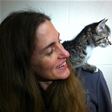
October 2012 by Sandra Newbury, DVM
Audience: Executive Leadership, Foster Caregivers, Public, Shelter/Rescue Staff & Volunteers, Veterinary Team
Video Length: 86 minutes
Cats are extremely sensitive to noise, crowding, and stress - three things that are in abundant supply in many animal shelters. These adverse conditions often lead to illness in sheltered cats, particularly the most common of all feline shelter diseases, upper respiratory infection (URI).
The good news is that by decreasing crowding and reducing stress, you can drastically cut the incidence of feline URI in your shelter's cat population.
Maddie's Fund® presents the second in a two-part series on feline URI in shelters: Fixing the Feline Housing Crisis: How Shelter Housing Can Make Cats Sick - And What You Can Do About It, presented by Dr. Sandra Newbury of the Koret Shelter Medicine Program at the UC Davis School of Veterinary Medicine.
Attendees will learn:
- How to understand the natural behavior of cats
- How to set up shelter housing to reduce stress
- The importance of giving cats a place to hide when stressed or fearful
- The impact of housing cats near dogs
- How improvements in noise levels, light cycles, and enrichment can benefit cats
- Temperature, air quality, and ventilation requirements for URI prevention
- How to understand exposure risks
- How to set up separation and isolation for sick cats
Fixing the Feline Housing Crisis: How Shelter Housing Can Make Cats Sick - And What You Can Do About It, is part of an ongoing series of educational programs from Maddie's Institute, a program of Maddie's Fund®, the nation's leading funder of shelter medicine education. Maddie's Institute brings cutting edge shelter medicine information from universities and animal welfare leaders to shelter veterinarians, managers and staff as well as private practice veterinarians, rescue groups and community members to increase the lifesaving of homeless dogs and cats community-wide.
This course has been pre-approved for Certified Animal Welfare Administrator continuing education credits.
After viewing the presentation, click here to take the quiz and receive a Certificate of Attendance!

Sandra Newbury, DVM
Dr. Newbury is a graduate of the University of Wisconsin-Madison School of Veterinary Medicine with a special interest in infectious disease and population management as it relates to group health. Dr. Newbury joined the Koret Shelter Medicine Program at the University of California Davis (UC Davis) in 2006. She also serves as the Chair of the Shelter Standards Task Force of the Association of Shelter Veterinarians and as Adjunct Assistant Professor of Shelter Medicine in the Department of Pathobiology at the University of Wisconsin-Madison School of Veterinary Medicine.
Dr. Newbury has published several and book chapters relevant to shelter medicine. Her work has focused on infectious disease, immunology, and population medicine to improve understanding of shelter animal health, disease response and animal welfare. Dr. Newbury's focus in the last several years has been to open a discussion around the concept of capacity for care in the field of animal sheltering, examining means by which capacity needs could be estimated and adequate capacity could be better defined.
Dr. Newbury travels throughout the year and has worked with shelters of all kinds across the U.S. and, more recently, in Canada and Australia. Dr. Newbury focuses on partnerships between shelters, veterinarians and the community to improve health, welfare and positive outcomes for homeless animals. Dr. Newbury and her son share their home in Madison with several minimally compliant and beloved pets.